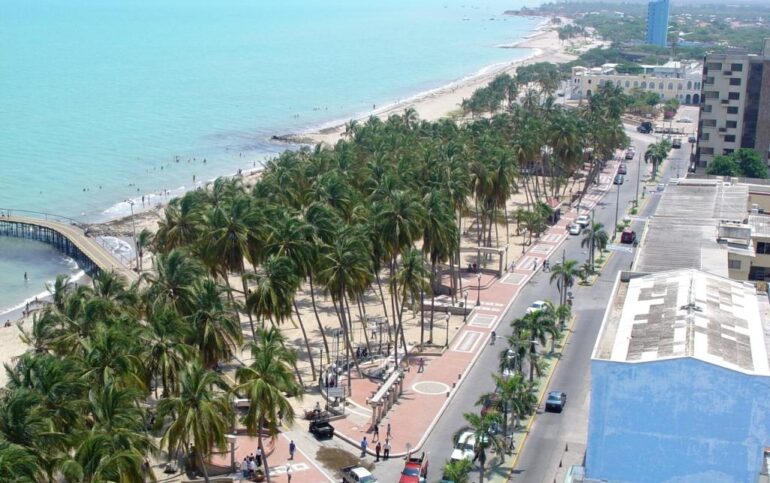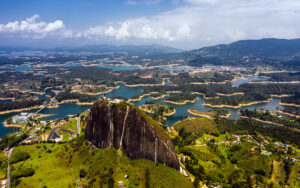Riohacha is a city located in La Guajira, Colombia, where the Ranchería River empties into the Caribbean Sea. It is known as the gateway to La Guajira territory.
It is a city full of color, flavor, and culture. Its indigenous, Afro-descendant, and mixed traditions are reflected in its cuisine, music, and art. The city has a great variety of typical dishes, such as coconut rice, fried fish, and snail ceviche. In addition, its celebrations and festivals, such as “Feria de La Santa Cruz” and “Feria de San Juan,” are known throughout the region for their animation and joy. It is a place with a rich cultural heritage worth visiting.
Riohacha is the northernmost capital on the mainland of America and is known as the home of the Wayuu, one of the largest indigenous ethnic groups in Colombia.
The Wayuu have a rich and diverse culture, with a strong tradition in handicrafts, such as the famous “wayuu backpacks” and carpet weaving. Their lifestyle is based on agriculture and fishing, and their traditional religion has a strong connection to nature and spirits. Visitors can learn about the Wayuu culture through visits to their communities, where they can see their customs and traditions firsthand. It is a unique experience that offers valuable insight into the cultural diversity of Colombia.
The Charm of Riohacha
I love Riohacha, it is a town and city at the same time, with very charming attractions. Of the department capitals that I enjoy the most is this one, which has the charm of the waves and refreshing breeze.
The capital of La Guajira can be used as a center to from there visit Dibulla, enjoy the beaches of Mayapo, or even visit Maicao. To get to the Cavo de la Vela, it is more convenient to be located in Uribia.
Life in Riohacha is relaxed and friendly, with a cool breeze and the waves of the Caribbean Sea as a background. It is a city that combines the best of both worlds, with a modern city and a rural environment. This combination is one of the reasons why the city is so attractive to live in.
In summary, Riohacha is a place full of charm, flavor, and culture, with a wide variety of tourist attractions and a relaxed and friendly life. We invite everyone to visit this city and consider living in it.
It has a wide network of educational institutions with an approximate number of 10 public schools for basic secondary (or high school) that distribute primary basic education centers with a total average of 13 unique centers for this school formation.
Although there are actually other schools that present deficiencies in terms of their infrastructure, so little are mentioned as official schools. Generally, these schools are located in the southern part of the city.
Regarding the corregimientos, each main community has an educational institution for primary and secondary education, and in some cases, the same center provides both levels of education in different shifts.
Preschool education is distributed among the different centers where primary education is taught and there is also a network of nurseries for children under three years old, subsidized by the Colombian Institute of Family Welfare.
Regarding private education, there are eight centers that provide primary and secondary education, and some also offer preschool education.
Festivals and Events
The city has experienced a period of cultural socialization since the 90s when, in addition to the Patron Saint Festivals of the Neighborhoods, Communities, and Barrios, various cultural festivals and events have also been held such as the Teatrízate Theater Festival, the AKUENTAJUÎ International Storytellers Festival, Ibercaribe “International Meeting of Oral Narrators in the Caribbean”, the Traveling Dance Festival and the Dance Festival for Couples, the Bolero Festival, the Pajará Music Festival (vallenato), the Alternative Poetry Festival. The cultural events of greater tradition are the Patron Saint Festival of the Virgin of Remedies (February 2), the Riohacha Carnival. Recently, high-impact events have been organized at the national and international level such as the Hay Festival Riohacha (chapter of the Hay Festival Cartagena de Indias) and the Francisco el Hombre Festival of contemporary vallenato music.
The Francisco el Hombre Festival is a cultural project that institutionalizes an annual recognition of contemporary vallenato music, through those who stand out as its best interpreters. The Festival will promote and exalt the artistic quality of current vallenato expressed in its different variations, namely: traditional, new wave, romantic, or modern.
Gastronomy
The Wayuu heritage in Riohacha includes dishes such as roasted or stewed goat, cured beef, and viscera-based dishes like asadura and friche. Other dishes include shrimp rice, marinated sierra fish with bean rice, chipichipi rice, bonito salad, dogfish salad, chucho salad, ray fish salad, macabi meatballs, anise arepuela, chichigüare arepa, Machobayo arepa, Galán corozo arepa, yucca pudding (Tomarrazón), fresh corn chicha, nispero juice, iguaraya juice, wild cherry juice, canned uvita juice, fried turtle in its own fat, and turtle rice.
Desserts include traditional cocada (coconut sweet), Monguí milk candy, shrimp milk balls, icaco sweets, sesame, corn, green papaya, grapefruit, and potato sweets.
Culture
Riohacha is a diverse and multicultural Caribbean city, enriched by a wide range of rites, customs, traditions, and cultural expressions, nourished by its new settlers: Afro-descendants and Europeans, and its ancestral indigenous inhabitants: the Wayuu on the plains and the Wiwa and Kogui in the Sierra Nevada de Santa Marta.
The city has three public libraries: Sister Josefina Zúñiga Departmental Library, Admiral Padilla Library, and Republic Bank Library, in addition to the University of La Guajira Library and about a dozen school libraries, and soon the Virtual Library built by the Riohacha Diocese.
Riohacha is also the birthplace of several notable figures on a national and regional level, such as Admiral José Prudencio Padilla, politician Luis Antonio Robles, the maternal grandparents of Nobel Prize-winning author Gabriel García Márquez, and also the birthplace of Arnoldo Iguaran, a player for the Colombian National Team in the 80s and 90s.



